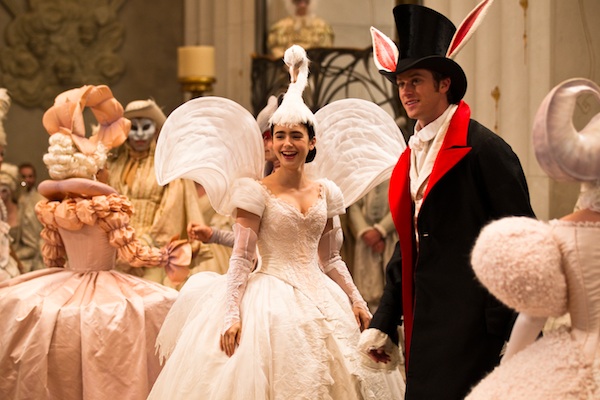I already declared my love for Aardman Animations when I wrote about Arthur Christmas in January. So it should be no surprise that I was desperate to see The Pirates! Band of Misfits, the latest addition to the Aardman legacy of stop-motion magic.
The movie is set in 1837 and follows a band of English pirates led by their captain, who is imaginatively named the Pirate Captain. He is voiced by Hugh Grant, and if I hadn't told you that, you would never guess it. The Captain is desperate to win the Pirate of the Year award but simply cannot compete with the other far more competent pirates who are raking in the gold and jewels. Desperate to plunder his way into the big time, he tries to hold up every passing ship but he can only seem to find ships filled with rotting plague victims, schoolkids on a field trip, or ghosts. His First Mate (voiced splendidly by Watson, i.e. Bilbo Baggins, i.e. Martin Freeman) urges him to loot one more ship. It turns out this ship is the Beagle, containing a man named Charles Darwin (perhaps you've heard of him?). The pirates are disgusted to find that they've captured yet another ship that is sorely lacking in gold but stuffed full of baboon kidneys. However, Darwin discovers a real treasure when he realizes that the Pirate Captain's pet parrot, Polly, is in fact a dodo.
Darwin tells the Captain that if he shows off Polly at the Royal Academy in London, he will be a shoo-in to win the glamorous Scientist of the Year award. With stars in his eyes, the Captain agrees, despite the protestations of his crew who are worried about entering London where the pirate-hating Queen Victoria might have them arrested at any minute. What follows is a lot of scheming and intrigue, as Darwin turns out to have designs on the dodo himself, and Queen Victoria turns out to not be such a genteel royal after all.
The highlight of the movie for me was the voice acting. Hugh Grant, Martin Freeman, and David Tennant (as Charles Darwin) are all delightful and throw themselves into their characters with gusto. Ashley Jensen, Brendan Gleeson, and Imelda Staunton also offer up their talents, and recognizing their voices is one of the key delights of watching this film. True to form, Aardman's stop-motion animation is breathtaking but also incorporates a great deal of CGI for the extended landscapes and sea graphics. And of course, the dialogue is characteristically sharp and funny, with plenty of one-liners and innuendo presented at a rapid-fire pace.
Perhaps it's because we've already been saturated with the Pirates of the Caribbean franchise, but the movie didn't feel as fresh as other Aardman features have been, and the Pirate Captain could sometimes seem like just another goofy Captain Jack Sparrow. But the story is sufficiently compelling and even features a cameo from a flirty Jane Austen. Really, what more could you want?
The movie is set in 1837 and follows a band of English pirates led by their captain, who is imaginatively named the Pirate Captain. He is voiced by Hugh Grant, and if I hadn't told you that, you would never guess it. The Captain is desperate to win the Pirate of the Year award but simply cannot compete with the other far more competent pirates who are raking in the gold and jewels. Desperate to plunder his way into the big time, he tries to hold up every passing ship but he can only seem to find ships filled with rotting plague victims, schoolkids on a field trip, or ghosts. His First Mate (voiced splendidly by Watson, i.e. Bilbo Baggins, i.e. Martin Freeman) urges him to loot one more ship. It turns out this ship is the Beagle, containing a man named Charles Darwin (perhaps you've heard of him?). The pirates are disgusted to find that they've captured yet another ship that is sorely lacking in gold but stuffed full of baboon kidneys. However, Darwin discovers a real treasure when he realizes that the Pirate Captain's pet parrot, Polly, is in fact a dodo.
Darwin tells the Captain that if he shows off Polly at the Royal Academy in London, he will be a shoo-in to win the glamorous Scientist of the Year award. With stars in his eyes, the Captain agrees, despite the protestations of his crew who are worried about entering London where the pirate-hating Queen Victoria might have them arrested at any minute. What follows is a lot of scheming and intrigue, as Darwin turns out to have designs on the dodo himself, and Queen Victoria turns out to not be such a genteel royal after all.
The highlight of the movie for me was the voice acting. Hugh Grant, Martin Freeman, and David Tennant (as Charles Darwin) are all delightful and throw themselves into their characters with gusto. Ashley Jensen, Brendan Gleeson, and Imelda Staunton also offer up their talents, and recognizing their voices is one of the key delights of watching this film. True to form, Aardman's stop-motion animation is breathtaking but also incorporates a great deal of CGI for the extended landscapes and sea graphics. And of course, the dialogue is characteristically sharp and funny, with plenty of one-liners and innuendo presented at a rapid-fire pace.
Perhaps it's because we've already been saturated with the Pirates of the Caribbean franchise, but the movie didn't feel as fresh as other Aardman features have been, and the Pirate Captain could sometimes seem like just another goofy Captain Jack Sparrow. But the story is sufficiently compelling and even features a cameo from a flirty Jane Austen. Really, what more could you want?








